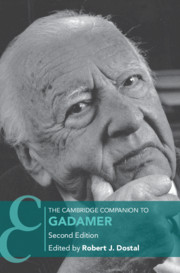Book contents
- The Cambridge Companion to Gadamer
- Other Volumes in the Series of Cambridge Companions
- The Cambridge Companion to Gadamer
- Copyright page
- Contents
- Contributors
- Abbreviations
- Introduction
- 1 Gadamer (1900–2002)
- 2 Gadamer’s Basic Understanding of Understanding
- 3 Getting It Right
- 4 Philosophical Hermeneutics, Language, and the Communicative Event
- 5 Phronesis and Solidarity
- 6 Gadamer’s Herderian Critics
- 7 Gadamer on the Human Sciences
- 8 Art Experience and Its Transformative Potential in Gadamer’s Hermeneutics
- 9 Lyric as Paradigm
- 10 Gadamer, the Hermeneutic Revolution, and Theology
- 11 Hermeneutics in Practice
- 12 Gadamer’s Hegel
- 13 Gadamer’s Relation to Heidegger and to Phenomenology
- 14 The Constellation of Hermeneutics, Critical Theory, and Deconstruction
- 15 Hermeneutics in a Broader Horizon
- Bibliography
- Index
- Other Volumes in the Series of Cambridge Companions (continued from page ii)
4 - Philosophical Hermeneutics, Language, and the Communicative Event
Published online by Cambridge University Press: 29 July 2021
- The Cambridge Companion to Gadamer
- Other Volumes in the Series of Cambridge Companions
- The Cambridge Companion to Gadamer
- Copyright page
- Contents
- Contributors
- Abbreviations
- Introduction
- 1 Gadamer (1900–2002)
- 2 Gadamer’s Basic Understanding of Understanding
- 3 Getting It Right
- 4 Philosophical Hermeneutics, Language, and the Communicative Event
- 5 Phronesis and Solidarity
- 6 Gadamer’s Herderian Critics
- 7 Gadamer on the Human Sciences
- 8 Art Experience and Its Transformative Potential in Gadamer’s Hermeneutics
- 9 Lyric as Paradigm
- 10 Gadamer, the Hermeneutic Revolution, and Theology
- 11 Hermeneutics in Practice
- 12 Gadamer’s Hegel
- 13 Gadamer’s Relation to Heidegger and to Phenomenology
- 14 The Constellation of Hermeneutics, Critical Theory, and Deconstruction
- 15 Hermeneutics in a Broader Horizon
- Bibliography
- Index
- Other Volumes in the Series of Cambridge Companions (continued from page ii)
Summary
Gadamer’s hermeneutics is concerned with the experience of understanding that takes place in living language. Living language is a matter of conversation and dialogue. Conversation and dialogue always take place in a living language within the historical context of a tradition. Gadamer’s hermeneutics challenges philosophy’s usual focus on the logic of statements. This is a profoundly Socratic-Platonic idea. The world is presented in language as a communicative event which is dialogical. The dialectic of the word in hermeneutics has a speculative structure.
- Type
- Chapter
- Information
- The Cambridge Companion to Gadamer , pp. 93 - 116Publisher: Cambridge University PressPrint publication year: 2021



